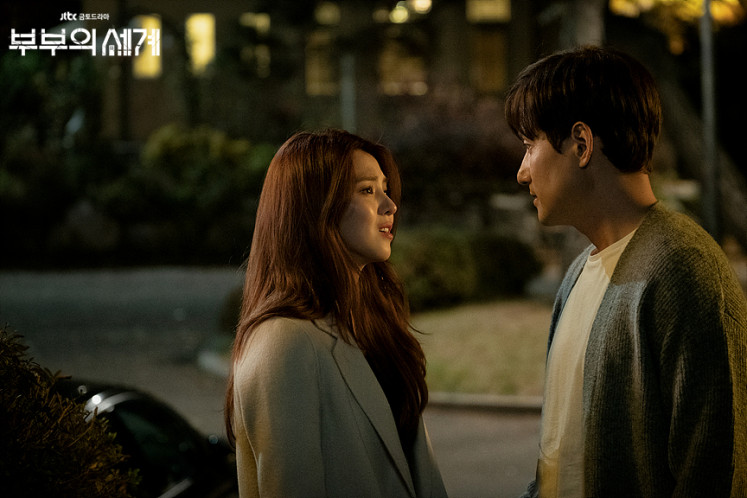Popular Reads
Top Results
Can't find what you're looking for?
View all search resultsPopular Reads
Top Results
Can't find what you're looking for?
View all search results‘The World of the Married’ triggers conversation about culture, legal system
Change text size
Gift Premium Articles
to Anyone
South Korean drama series The World of the Married is setting record-high ratings in Indonesia.
The World of the Married is among hot topics in chat groups and social media, as well as a rich source of funny memes but there are valuable lessons yet to be learned.
The nail-biting adaptation of the United Kingdom’s BBC One series, Doctor Foster, will air its final two episodes next week, leaving viewers on an emotional rollercoaster .
The World of the Married, also known as A World of Married Couple in its translated Korean title, follows Ji Sun-woo (played by Kim Hee-ae), an accomplished doctor revered by her upper-class circle, who discovers her husband – financially-struggling filmmaker Lee Tae-oh (Park Hae-joon) – is having an affair with a younger woman named Yeo Dae-kyung (Han So-hee).
A still from 'The World of the Married.' (JTBC via The Korea Herald/File)The series started airing on JTBC cable channel on March 27, on Fridays and Saturdays, and as of May 2 recorded the highest viewer rating of 26.7 percent in the Korean drama category in the country’s cable television history.
The series is available on OTT film streaming app iflix with Indonesian subtitles and on account of its popularity, broadcast company Trans TV will start airing it on May 11.
The original series consisted of a 10-part broadcast in two seasons in 2015 and 2017, mainly depicting the ugly process of divorce in the British upper-class community. It ends with a cliffhanger after the couple’s teenage son goes missing and creator Mike Bartlett has yet to plan a continuation.
The Korean version, however, wraps up the story in 16 episodes. While it closely follows the original plot, it remains to be seen whether screenwriter Kang Eun-kyung will follow the ending of the original series.
It has so far steered away from the typical revenge drama and instead explores the complex aspects of marriage life – the characters’ sexual life that got the series slapped with an R rating in South Korea and how support systems can be precarious.
The protagonist’s character arc fits the proverb “Hell hath no fury like a woman scorned” which, unfortunately, also goes for the Indonesian viewers who were enraged by the other woman they called pelakor – a slang word for husband snatcher – having flooded the comment section of the actress’ social media account with expletive words.
According to media and culture researcher Nur Imroatus, after the airing of a subbed episode on May 2, Twitter recorded 2,200 conversations about the story in Indonesia alone, achieving an engagement of 2 million users.
There were 1,500 news articles shared on social media regarding the series the same day.
“No wonder the series has become a trending topic. The story itself hits so close to our daily lives. Many people refused to watch the series despite its popularity because they were afraid of seeing themselves in the story or being confronted by the source of their discomfort in it,” said Imroatus, who is also the research and training manager of big data company Indonesia Indicator.
Imroatus was one of the panelists in a virtual public discussion held by Rahma.id, a newly launched web magazine for Muslim women, on May 2. The discussion was a follow-up to its analyses of the issues depicted in the series, which gained much attention from its readers.
The contributing authors, to name a few, are Imroatus, Siti Aminah Tardi – a commissioner with the National Commission on Violence Against Women (Komnas Perempuan), and Ria Oktorina of family empowerment initiative Relawan Keluarga Kita, wrote about power relations in marital relationships, prolonged abuse, and child-rearing in a dysfunctional family.
More than 60 people from different parts of the country and abroad attended the discussion, actively sharing their opinions and experience.
Another speaker, Wahyudi Akmaliyah from the Indonesian Institute of Sciences (LIPI), who has done research on the Hallyu Wave, said the Korean film industry was known for its research in developing a story that could easily come across as real.
“The story is adapted to meet Asian values. It is not common, however, to see a woman depicted on screen with such an amount of resistance in dealing with the situation, which excites viewers,” said Wahyudi, explaining the high emotional engagement from Indonesian viewers.
Panelist Delita Sartika, a pop culture observer from Jambi State University, echoed his opinion, adding that she deplored passive audiences who were not aware of the agenda of pop culture products and consuming them at face value.
“Most viewers see only the romantic relationships depicted in the series, while there are many other messages being conveyed in the story,” she said.
“In this case, the audience needs alternative narration in which they can learn about the issues related to women they can find useful in their daily lives.”
Imroatus, who was a member of the rapporteur team on women and religious issues for Komnas Perempuan, suggested there be efforts to give the public more information on the importance of equality in marital relationships and the unavoidable power relations.
“People need to understand that both self-identity and identity as a unit exist in a marriage. We need more pop culture products on marital relationships in which no one has to choose between divorce and staying married.”
Komnas Perempuan commissioner Alimatul Qibtiyah said the series showed that infidelity was faced by both career women and devoted homemakers.
“An equal relationship between a husband and wife is important and should be discussed ahead of marriage. Even a prenuptial agreement is not enough,” she said.
“This series also shows the importance of sisterhood, unlike Indonesian dramas, which put the blame on the other woman.”
Other takeaways from the series were offered by Rita Pranawati from the Indonesian Child Protection Commission. She highlighted the prolonged abuse phenomenon where former spouses still hurt after a marriage ends.
“Our legal system has yet to institutionalize post-marriage counseling, an important phase to make sure the parties involved can move on without harboring revenge.
“The laws are also not adequate in regulating the rights of the parties after separation, including the rights of children. There are lessons we can learn from the series, but it is important to start educating the public about their rights in marriage,” Rita added.












